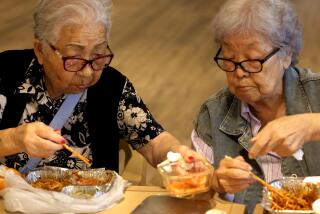Feeding the Homeless: a Job for People Who Just Want to Help
About noon every day, except Sundays and Tuesdays, a line forms outside the Spanish ranch-style building on the corner of south Central Avenue and Windsor Road in Glendale.
The men and women in it are from the ranks of Glendale’s homeless. Most of the day, they are dispersed in the doorways, shanties and automobiles they have fashioned as home. At midday, they go to the neatly painted tile-roofed building that has come to be called the Lord’s Kitchen.
It serves the only free lunch in Glendale.
Five days a week, volunteers from several churches and the Red Cross cook lunch and serve all comers in a program that has evolved almost by chance into the area’s major offering to the homeless.
The building, once an office of the Triple A, is part of the Salvation Army’s Glendale establishment on the corner. For many years, it had no definite purpose except to add space for the Army’s missions. Two community groups, Home League and Golden Agers, used it as a meeting hall.
The transition to the Lord’s Kitchen began humbly on Jan. 14, 1987.
On that day, several parishioners of the Glendale Presbyterian Church cooked a meal and served it from a card table outside the building.
“This was a group of people that said, ‘Let’s do something,’ ” said the Rev. Greg Roth, the church’s associate pastor of missions and social concerns.
Roth said the Glendale Presbyterian group was answering a call to action without a specific plan.
“There were a lot of people who came for food,” he said. “We just got tired of turning them away or referring them around.”
They were aware that referrals were of limited value in a city that had taken a hands-off, if tolerant, posture toward the homeless who were becoming more noticeable on its public streets.
Roth thought the Salvation Army property would be accessible to most of the area’s homeless. He asked Lt. Stephen D. Bradley, then the Salvation Army’s commanding officer in Glendale, for permission to set up a temporary kitchen on the grounds.
The lunch became a weekly event, called the picnic. Gradually, Roth’s group started cooking more often and other church groups asked if they could help on other days. Roth was soon coordinating a complex schedule involving seven churches.
Attendance, initially about 30, has climbed to about 50 a day.
Meanwhile, the picnic’s mission enlarged from simply feeding to a more complex sort of service.
While supervising on a recent Monday, Roth explained it this way:
“We cook the food. We eat the same food, find out about their lives, find out if we can make any referrals, show them that we care for them. Be a friend.”
One of the regular friends was a tall, slender young man in a white cook’s cap. Keith Kindstrom, a researcher for the National Economic Research Associates, had driven from his job in downtown Los Angeles, as he does every Monday.
He spooned out Spanish rice and corn for about 15 minutes, then served up a dish for himself and sat at one of the long tables to join several guests in light talk.
Whatever such conversations reveal is all that the program knows of its clients. At one time, Roth struggled with the idea of initiating a screening process, in the name of accountability. The idea was rejected.
“We thought about the possibilities a lot,” Roth said. “We finally decided that instituting any system of identifying people would so endanger the fundamental program of serving them that it wasn’t worth it. It is simply easier and better to get to know the personalities.”
In June, the Glendale command passed to Lt. Kenneth Hodder, a sixth-generation Salvation Army officer, and his wife, Jolene, whose lineage in the Army falls short of his by only a generation.
Hodder saw a bigger future for the Kitchen.
“We had some planning meetings,” he said.
Hodder decided to move Home League and Golden Agers into the headquarters next door to make room for an indoor lunch program. He also moved the Army’s Meals on Wheels and emergency food and shelter programs in with it.
“We’d like to see it grow as a means of access to the homeless to the network of social services that is available in Glendale,” he said. “It’s an informal means to be plugged into the available services.”
To instill a sense of permanence and mission, he renamed the building the Lord’s Kitchen.
“I would like to see it grow in meeting the spiritual needs of these people,” he said. “We hope that this will be an opportunity for us to share the gospel of Jesus Christ with them.”
Hodder blesses each meal. He’s getting to know the clients. He recently performed a renewal of vows for Elizabeth and Jerry Willson, who were married 3 years ago in Las Vegas and now live in a car.
For people like the Willsons, Hodder also plans to add a sixth day for food service.
“The seventh day has to be reserved for worship,” he said. “But every other day, we love to have them.”
More to Read
Sign up for Essential California
The most important California stories and recommendations in your inbox every morning.
You may occasionally receive promotional content from the Los Angeles Times.







